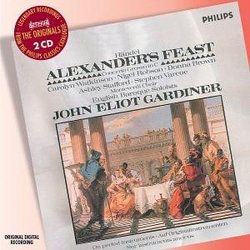| All Artists: George Frederick Handel, John Eliot Gardiner, Ashley Stafford, English Baroque Soloists, Donna Brown, Nigel Robson Title: Händel: Alexander's Feast Members Wishing: 0 Total Copies: 0 Label: Philips Original Release Date: 1/1/2007 Re-Release Date: 3/27/2007 Genre: Classical Styles: Opera & Classical Vocal, Chamber Music, Forms & Genres, Concertos, Historical Periods, Baroque (c.1600-1750), Classical (c.1770-1830) Number of Discs: 2 SwapaCD Credits: 2 UPC: 028947577744 |
Search - George Frederick Handel, John Eliot Gardiner, Ashley Stafford :: Händel: Alexander's Feast
 | George Frederick Handel, John Eliot Gardiner, Ashley Stafford Händel: Alexander's Feast Genre: Classical |
Larger Image |
CD Details |
CD ReviewsA voice teacher and early music fan George Peabody | Planet Earth | 06/25/2007 (5 out of 5 stars) "ALEXANDER REJECTED - ST. CECELIA RESPECTED!!!! Alexander's Feast or The Power of Music is based on an ode by John Dryden to celebrate St. Cecelia, the patron of music, in 1697. Direct connections between the Saint and Dryden's text are few; the text makes reference to her only in its concluding pages. It was arranged for Handel into a sequence of recitatives, arias, and choruses cast in two parts, by a minor man of letters, Newburgh Hamilton. The 'entertainment', as it was described, is set at the famous feast of Alexander held to celebrate the conquest of Persepolis. The musical allegory is enhanced by the inclusion,at the feast, of the legendary singer Timotheus,and the comparison between him and Cecelia form the climax of the work. There is little dramatic development, but Dryden's picturesque imagery allowed Handel to produce a superbly varied score that includes such famous numbers as the two bass arias "Bacchus, ever fair" (with chorus) and "Revenge, Timotheus cries". The work calls for five soloists (SAATB), chorus, and a large orchestra employing recorder, oboes, bassoons, horns, trumpets, timpani and strings. It was first performed in Covent Garden on Feb. 19, 1736; on that occasion it was supplemented by several concerti, including the Concerto Grosso in C (now known as the Alexander Feast concerto). John Eliot Gardiner handles Handel with his usual expertise. The chorus is spirited and buoyant; the soloists are outstanding! Steven Varcoe is the perfect Basso to sing such arias as "Bacchus, ever fair and young"; I can even picture him as a jolly and rather rotund figure for he has such a vibrant, but quite clear, tone quality. His British contemporary tenor, Nigel Robson, has a wonderfully resonant and expressive quality, 'dripping' with emotion on demand, such as in his aria "War, he sung is toil and troubles". If you have not heard him sing before this, I suggest you look into the disc : Jephtha, in which he plays the lead role of Jephtha (Gardiner's 1988 recording); a truly wonderful display of his voice as well as Varcoe, Chance and Dawson. I find that Ashley Stafford's voice, while very pretty, doesn't quite approach the emotional level that should be present in his role. I think he does a much more impressive job as an ensemble singer, but this does not detract from the entire disc. Donna Brown and Carolyn Watkinson as soprano and contralto respectively are excellent throughout. The Chorus is SUPERB as is the accompanying large orchestra. All very well done. This 1987 recording is accompanied by a 35 page booklet with pertinent information in English, French and German. It includes the complete text in English and German." Great Handel in a Great Performance Paul S. Rottenberg | Ft. Lauderdale, FL | 12/20/2007 (5 out of 5 stars) "This is one of Handel's two odes for St. Cecilia's day. St. Cecilia is the patron saint of music, and it was once traditional in England to write a musical ode in honor of her day. Purcell wrote several. This is the grander of Handel's two odes, though the shorter piece is wonderful, too. Both are settings of texts by John Dryden, so Handel had a fine librettist, and he wrote some of his best vocal music in both scores. In the present work, Alexander the Great is influenced by music's great power, and you will be, too in this great performance. We have John Eliot Gardener to thank for this performance since there are (I believe) only two recordings of this work currently available. Snap up this set now before they run out of copies!"
|
